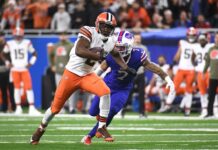[ad_1]
NEW YORK – Jannik Sinner raised his arms above his head, closed his eyes and took a deep breath.
He didn’t show the slightest hint of a smile until he dropped his arms back to his side.
As the rest of his team and players rose from their seats, his coach Darren Cahill remained in his seat, hunched over with his head in his hands. He appeared to be wiping tears from his face.
The 23-year-old Italian had just won the US Open with a stunning 6-3, 6-4, 7-5 win over American Taylor Fritz. After months of uncertainty and doubt, the relief was palpable with every step he took to the net to shake Fritz’s hand and embrace him, and as he slowly made his way to his cabin to embrace everyone who had been with him on the flight.
It was Sinner’s second title of the year – and of his career – and he became the first Italian to win the New York Open and only the third player in the Open Era to win his first two Grand Slam titles in the same season. It also cemented his position as the world’s No. 1.
But in those moments after the match, Sinner wasn’t necessarily thinking about the big picture or what this meant for his long-term legacy in the sport. Rather, it was a weight lifted from his shoulders after a difficult few months of waiting to learn his fate on the tennis court after testing positive for a banned substance in two separate tests in March.
“This title means a lot to me, because the last period of my career was not easy at all,” Sinner told the crowd shortly after.
Sinner opened the 2024 season with his first major title at the Australian Open, cementing his status as one of the sport’s best young stars — and a clear successor, alongside Carlos Alcaraz — who could help replace Rafael Nadal and Novak Djokovic once they eventually join Roger Federer in retirement.
He continued to show his prowess on hard courts, winning the Miami Open in March. He reached the semifinals of the French Open and finished as world number one. He reached the quarterfinals of Wimbledon in July.
Tonsillitis forced him to withdraw from the Olympics, but he returned in time for the summer hardcourt season. He reached the quarterfinals at the Canadian Open before shining at the Cincinnati Open, culminating in a title win, in the final qualifying event before the US Open.
Sinner appeared to be the favorite to win in New York and claim his second major title of the year.
But the day after lifting the trophy in Ohio, it was revealed that the 23-year-old had tested positive for a banned substance on two separate occasions in March. In a statement, the International Tennis Integrity Agency (ITIA) announced that Sinner had tested positive for low levels of clostebol, a banned anabolic steroid. He was provisionally suspended at the time but was able to compete during the appeals process.
During a hearing in August, India’s anti-corruption body said an independent panel had “determined that there was no wrongdoing or negligence in the case,” and blamed the contamination on Sinner’s then-physiotherapist Giacomo Naldi. Sinner’s then-fitness trainer Umberto Ferrara had purchased an over-the-counter spray containing the substance, which Naldi used on himself to treat a small cut before massaging Sinner. Both Naldi and Ferrara have since been fired from Sinner.
Despite being cleared to play at the US Open, and everywhere else, Sinner arrived in New York under a cloud of scrutiny. Many of his peers criticized the decision, questioning his treatment and speculating about double standards for the world No. 1. Nick Kyrgios called it “ridiculous” and added: “Whether it was by mistake or by design, you get tested twice for a banned substance (steroid)… you should be out for two years.”
“Different rules for different players,” wrote Denis Shapovalov.
During Sinner’s media appearance before the tournament, and three days after the news was announced, he was subjected to a series of questions from reporters – despite the coordinator’s attempts to limit such inquiries – about the results and the ruling. Sinner maintained his innocence and said that although his preparations for the tournament had not been “ideal” due to “certain circumstances”, he was still ready to play.
“Of course it’s not ideal before a Grand Slam,” Sinner said. “But I know deep down that I didn’t do anything wrong. I had to play for months thinking about this, but I remember that I didn’t do anything wrong. I always respect these rules, and I will continue to respect these anti-doping rules.”
“Obviously this result was a relief for me. It’s great to be back here. It’s a great city and a great place to play tennis. I’ll try to enjoy as much as I can and hopefully have a good tournament.”
In an interview with ESPN after Sunday’s final, Cahill said the team tried to keep Sinner in good spirits and fully focused on tennis, and not to stop him from playing. He said it was tough at times.
“Over the last three or four weeks, the last four months… (we just tried to) keep him focused on what we’re trying to achieve, and make sure I keep telling him that he’s done nothing wrong,” Cahill said. “So whatever happens, hold your head up high because you’ve done nothing wrong at all. Let’s play professional tennis and see what we can do during this period. And once we get through it, we’ll be able to move on from there. And we’ve gotten through it.”
During the opening set of his first-round match on the second day of the tournament, it seemed like the pressure was on Sinner. Facing Mackenzie McDonald, another American player in Ashe, Sinner struggled at first and lost 6-2. But there was no early exit. He fought back and recovered to win in four sets. He later said he tried to “stay on that level mentally.”
From there, he dropped just one set — to 2021 US Open champion Daniil Medvedev in the quarterfinals — during the rest of the tournament. During the semifinals, he fought off an initially tough battle with his friend Jack Draper. But while Draper was struggling with stress, anxiety and even vomiting on the court several times, Sinner remained calm. After two close sets early in the match, he closed out the match 6-2 in the third.
Against Fritz, who was playing the best tournament of his career and was backed by a raucous, pro-American crowd that occasionally chanted “USA,” Sinner seemed largely unfazed. Fritz led 3-2 in the opening set, but Sinner took control.
Finally, Fritz found another level in the third set, much to the delight of the crowd, serving at 5-4 to force a fourth set. But Sinner broke and won the last four games of the match to secure a straight-sets victory.
“I put myself in a good position to win the third set, but he played a good game when I went to serve,” Fritz said later. “But that’s how it goes, when you play, you know he’s the best player in the world right now.”
For much of the summer, Sinner wasn’t sure what would happen to him, or whether he would be allowed to play at the U.S. Open. Now, six months after his first positive test, Sinner leaves New York as the reigning U.S. Open champion.
“It means a lot. (My team and I) all know how much we’ve been through. We’ve worked hard for it. We’ve tried to accept the difficulties we’re facing and this is a really amazing achievement for me and my team,” Sinner told ESPN.
[ad_2]











